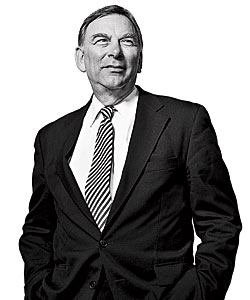Interview Conducted and Condensed by Jeff Bailey

You’ve carved out a second career leading troubled outfits since leaving Bank One as vice chairman in 1999: CEO of the Chicago Board of Trade; chief administrative officer of Chicago Public Schools, with an annual salary of $1; and now in charge of the institution set up to revive the community-building work of the failed ShoreBank, our city’s landmark do-gooder. What’s next—managing the Cubs?
My career at [Bank One] had a lot to do with change and fixing things, so I get asked. I’ve enjoyed being able to help.
Headhunters tell me there were CEO jobs for you at big banks if only you’d been willing to leave Chicago.
The family was settled here. I didn’t really want to disrupt that. I felt like I’d devoted 30 years to banking. It didn’t excite me.
You raised $157 million to try to save ShoreBank, but its losses swamped the effort, so you got the same investors to buy the bank’s business, for slightly less, and started Urban Partnership Bank. Is this a cleaner way to save what ShoreBank did—lend and invest in low-income communities—or would keeping it alive have been better?
Economically, this is clearly a better transaction. We’ll be financially stronger. On the other hand, you do give up the brand and the iconic nature of the old ShoreBank.
How will UPB be different?
We believe we can do more with small businesses and consumers in these neighborhoods. The prior institution had a development mindset—real estate. We will modernize the infrastructure, have ATMs, more modern branches.
What killed ShoreBank—its own bad lending or the housing collapse?
The truth is, both. Almost 65 to 70 percent [of lending] was real estate related.
Why did the likes of Goldman Sachs, GE, and Citi—all recipients of federal assistance after the financial crisis—pony up to help?
They do get Community Reinvestment Act credit [required by regulators] for it. They wanted to be viewed in this environment as supportive, as opposed to being demons.
President Obama’s onetime association with ShoreBank brought a political element to the rescue effort—some Republicans thought there was a sweetheart deal to save the thing. Did that screw up your plans?
We never got to the bottom of what was going on in Washington. We never approached the White House. So whatever people were accusing us of, we didn’t do.
Is trying to serve Chicago, Detroit, and Cleveland too much for UPB? Seems like Detroit has a class of troubles all its own these days.
We don’t quite know the answer to that yet. We made a commitment to stay in Cleveland and Detroit for at least a year.
What’s the biggest challenge?
We’re a very financially secure organization. At the same time, we are inheriting the old culture and practices. We have to retrain.
Photograph: Bob Stefko



